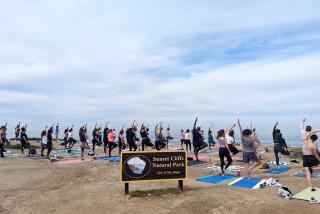Beauty and the Best : Bucolic Setting Belies Tough Trail Awaiting Ranger Cadets
- Share via
PACIFIC GROVE, Calif. — The dense pine forest is alive with birds chirping merrily, with deer, chipmunks, raccoon and other wildlife--an ideal setting for a state park ranger academy.
For the handful of cadet rangers attending the William Penn Mott Junior Training Center, however, the serene setting is somewhat deceptive. Enrollment here represents the culmination of a long, difficult struggle.
It is one of the hardest schools in the state to get into.
“Competition to become a state park ranger is unbelievable,” sighed Carol Provost of San Diego. She ought to know. She tried for six years before being accepted to the academy.
Provost, 30, is one of 15 women and 11 men now enrolled as ranger cadets at the state Department of Parks and Recreation training center. They were selected from a list of more than 2,000 applicants for the eagerly sought park ranger jobs.
They are halfway through an 18-week course for new rangers. Provost has a bachelor of science degree in resources management. She has been a seasonal ranger for the U.S. Forest Service and for the Parks Department the last six summers.
“Many of my classmates say being here is the biggest accomplishment of their lives. There are a lot of pitfalls. As many as 10% of the class usually washes out before the 18 weeks are completed. For me, my biggest accomplishment will be when I graduate, put on my Stetson and go to work as a ranger in one of the state parks,” Provost said.
California has 750 rangers staffing 250 park units. “We go into this thing for a sense of fulfillment, not for the money,” said Jay Hamann, 54, who graduated from the ranger academy last February, the oldest graduate in the 20-year history of the training center.
Cadets are paid $1,800 a month. Rangers earn between $22,404 and $33,396 a year, depending on experience.
Minimum age to become a ranger is 21. There is no maximum age limit. An applicant must have completed at least 60 units of college study and be physically fit. Oral and written exams are given, and there is psychological screening.
Many ranger cadets have had previous experience working as seasonal rangers with the National Park Service, U.S. Forest Service, Bureau of Land Management or state Department of Parks and Recreation, or have worked as rangers for county or city parks, as firefighters for the California Department of Forestry or as correctional officers. Many have college degrees, and a few have done graduate work.
Persistence and patience are a prerequisite to becoming a ranger cadet. Many try for years before being accepted. Hamann, now a ranger at Ocotillo Wells State Vehicular Recreation Area in San Diego County, had been an applicant eight years before he was finally accepted.
He is married and has five children and four grandchildren. He spent three years in the Marines, was a teacher-principal for a rural elementary school in Sierraville for nine years, taught in other schools and worked 10 summers as a seasonal ranger with the U.S. Forest Service.
“I love working outdoors with the public. I know I’m older than dirt to begin a new career, but I believe I have a lot of good years left and am certain I can make a valuable contribution to the state park system in California as a ranger,” Hamann said.
For him, the toughest part of his training as a ranger cadet was the physical fitness requirements, “the endurance runs, the obstacle course, climbing walls and fences that I had to do in order to graduate--but I made it. The Marines put a lot of that into me.”
Dave Matthews, 23, of Novato tried for three years before becoming a ranger cadet. He has a degree in recreation administration and worked as a seasonal employee with the National Parks Service. Sylvia Ramos, 33, has a degree in physical anthropology, is married to a state game warden and has an 8-year-old daughter. She waited four years before being accepted, working for a year as a ranger with the Ventura County Parks Department and for three years as a seasonal worker with the state Parks Department.
Cadet Elizabeth McDaniel, 31, from Tierrasanta in San Diego County, is the mother of three children. Her husband is a career man in the Navy. She studied for three years at the University of Guam and worked as a correctional officer for two years at the Ventura County Jail. She tried to become a ranger for four years before being accepted. “I love state parks and enjoy working with the public,” McDaniel said.
Each year, there are one or two ranger cadet classes at the Mott training center, depending upon need, as well as more than 20 other educational programs for Parks Department employees. Broc Stenman, 42, a 16-year veteran of the Parks Department, has been the director of the training center for seven years.
The academy began accepting students in 1969 in a small cottage here in Pacific Grove. At dedication ceremonies in 1974 for the training center, made up of three residential lodges, classrooms and administrative offices, the then-director of parks and recreation, William Penn Mott Jr., declared:
“For the first time in any state, a central facility has been built specifically to provide basic and advanced educational programs for people who operate and manage state parks, beaches and recreational areas.” The center was renamed in Mott’s honor later when he was director of the National Parks Service.
According to Stenman, to this day “no other state park department has a facility or program approaching California’s.”
The first 530 hours for a ranger cadet are spent completing the Police Officers Standards Training Program, a course required by many law enforcement agencies. This part of the training includes instructions in community relations, law, evidence, communications, vehicle operations, force and weaponry, defensive tactics, arrest control procedures, criminal investigation, custody and physical fitness.
Then comes 160 hours studying state park procedures, management policies, equipment operation and fire prevention and suppression, as well as learning about wildlife, park environment and the history of parks.
Field trips are made to parks for hands-on experience. Cadets receive 12 hours’ college credit upon completing the course.
In addition to the 26 ranger cadets now enrolled, there are seven state park lifeguards, who are also required to take ranger classes, in attendance. Also taking the course are three men and three women advancing to park superintendent positions who lack experience as rangers or peace officers.
More to Read
Sign up for The Wild
We’ll help you find the best places to hike, bike and run, as well as the perfect silent spots for meditation and yoga.
You may occasionally receive promotional content from the Los Angeles Times.






